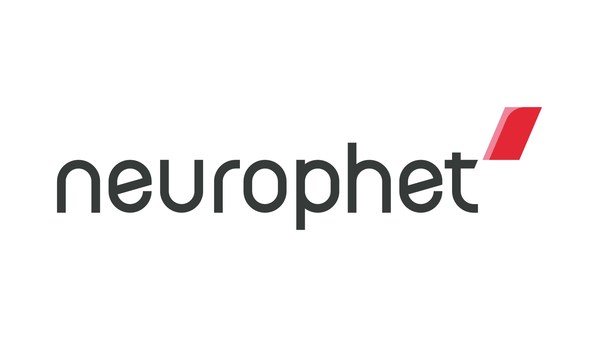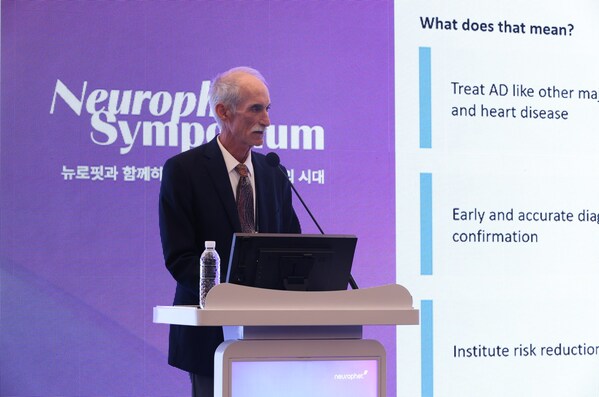Newest
-

Dongying Builds China's Leading Public Testing and Certification Platform for Offshore Wind Power Industry
-

Hefei Spring Festival Gala Sub-Venue: Understanding the City’s “Union” Through Four Moments of Palms Meeting
-

Musician Dai Yutong Finds Inspiration in Ancient Xun County: 'True Art Stems from Deepest Roots'
-

MEXC Releases February Proof of Reserve Report, BTC Coverage Rises to 267%
Neurophet to host Symposium featuring renowned expert in Alzheimer's disease treatment from the U.S.

- Invited Neurophet's scientific advisor Stephen Salloway,professor of Neurology at Brown Medical School as guest speaker
- Shared latest insights on brain image analysis used for prescription of Alzheimer's disease treatments such as 'Leqembi' and 'Kisunla'
SEOUL,South Korea,Oct. 18,2024 -- Neurophet,an artificial intelligence (AI) solution company for brain disease,hosted Neurophet Symposium with Professor Stephen Salloway,a leading authority for the establishment of Alzheimer's treatment guidelines in the U.S.,to share the latest insights with domestic medical professionals. About 60 medical professionals from the departments of neurology,radiology,psychiatry,and nuclear medicine,related to the practical use of Alzheimer's disease treatments,from across the country attended the event.

Professor Stephen Salloway
This symposium was held at JW Marriott Hotel Seoul with the title "Alzheimer's Treatment Era with Neurophet." At the symposium,international medical professionals exchanged the latest opinions on brain image analysis technology related to the prescription and interpretation of Alzheimer's disease treatments.
Stephen Salloway,professor of Neurology at Brown University and Won-Jin Moon,professor of Radiology at Konkuk University Medical Center attended as speakers. Kee-Hyung Park,professor of Neurology at Gachon University Gil Medical Center and Hyun Kook Lim,professor of Psychiatry at The Catholic University of Korea Yeouido St. Mary's Hospital also attended as chairs.
Neurophet recently appointed Professor Stephen Salloway as scientific advisor. He is a professor of Neurology and Psychiatry at the Warren Alpert Medical School of Brown University. He also serves as the Founding Director of Memory and Aging Program at Butler Hospital in the U.S.
Professor Salloway is a leading expert in the field of Alzheimer's disease treatments,providing clinical guidelines for the prescription of anti-amyloid treatments. He is actively involved in research on anti-amyloid treatments,including comparative studies between donanemab and aducanumab.
"This symposium was a valuable exchange between Professor Stephen Salloway,who presented the prescribing criteria for Alzheimer's disease treatments and leading medical professionals in the field of Alzheimer's treatment in Korea" said Jake Junkil Been,CEO of Neurophet. "Neurophet will continue to strengthen research and development related to Alzheimer's disease treatment prescriptions,further enhancing its expertise in brain image analysis."
Last July,Neurophet launched 'Neurophet AQUA AD',the software for Alzheimer's disease (AD) treatment prescription and monitoring treatment effects and side effects. This solution is currently preparing for medical device certifications in Korea,the U.S.,and Japan.
About Neurophet
Neurophet has specialized in developing solutions for diagnosis support,treatment guides,and treatment devices targeting brain diseases based on cutting-edge artificial intelligence (AI) technology. The company was founded in 2016 by Jake Junkil Been,CEO,and Donghyeon Kim,CTO,who developed the next-generation neuro-navigation system.
Major products include brain MRI analysis software "Neurophet AQUA",brain PET image analysis (PET tracer deposition) software "Neurophet SCALE PET",brain imaging treatment planning software for electric and magnetic brain stimulation "Neurophet tES/TMS LAB".
Neurophet has set its top priority to helping patients suffering from brain diseases. Based on expertise in neuroscience,Neurophet will continue to challenge and grow to explore the human brain's health and pioneer solutions for brain diseases with AI technology.

 2024-10-20
2024-10-20